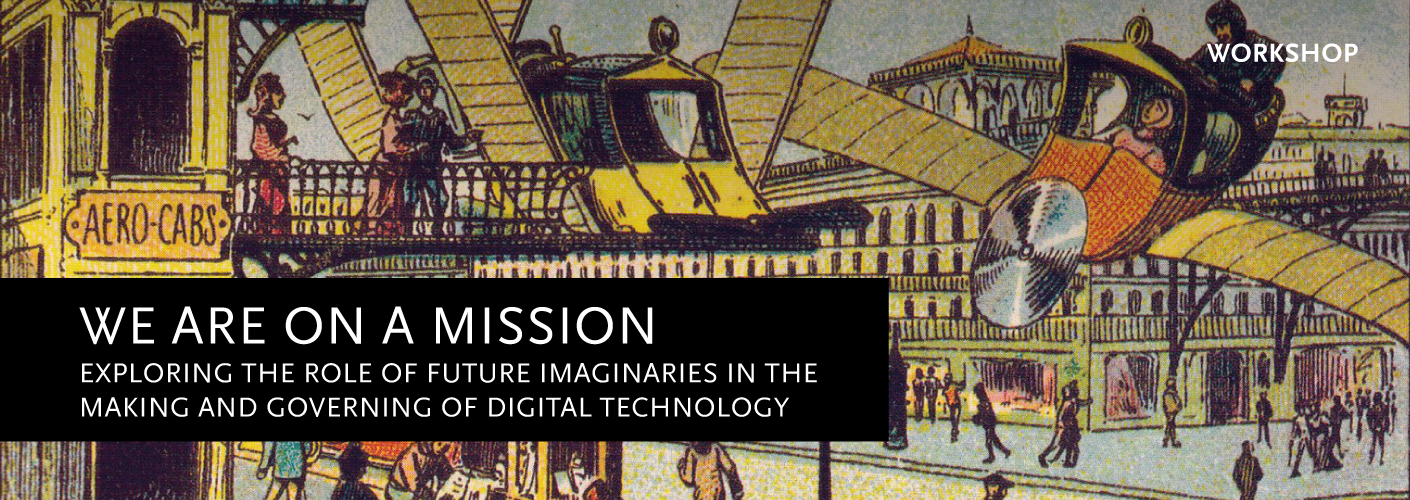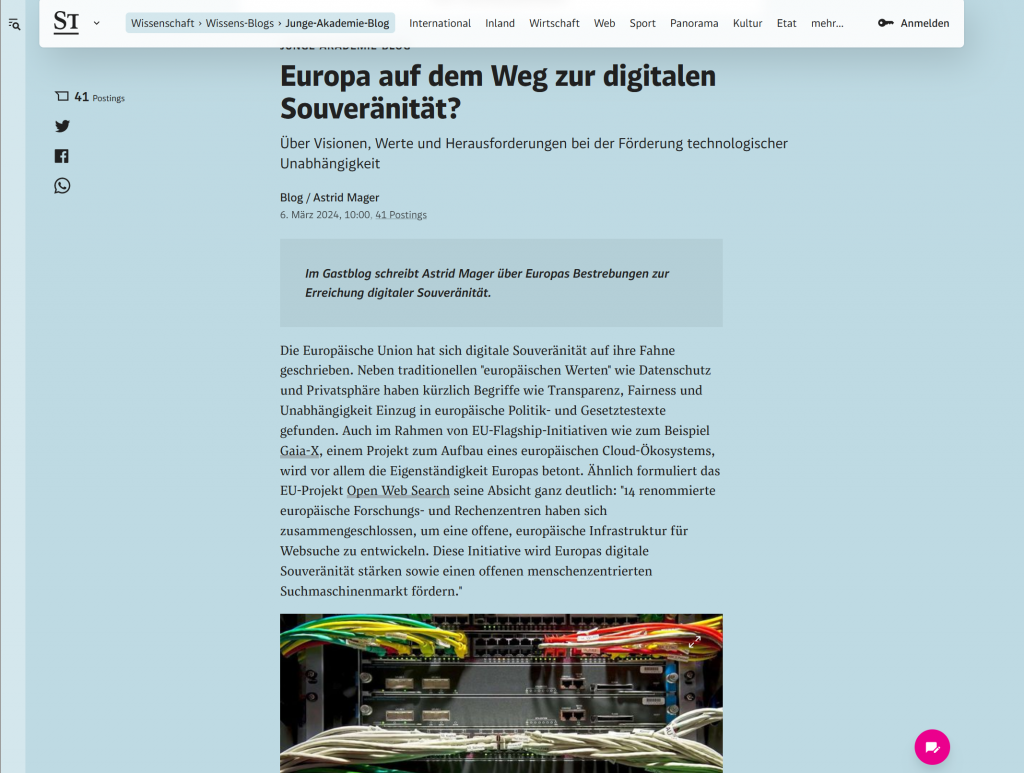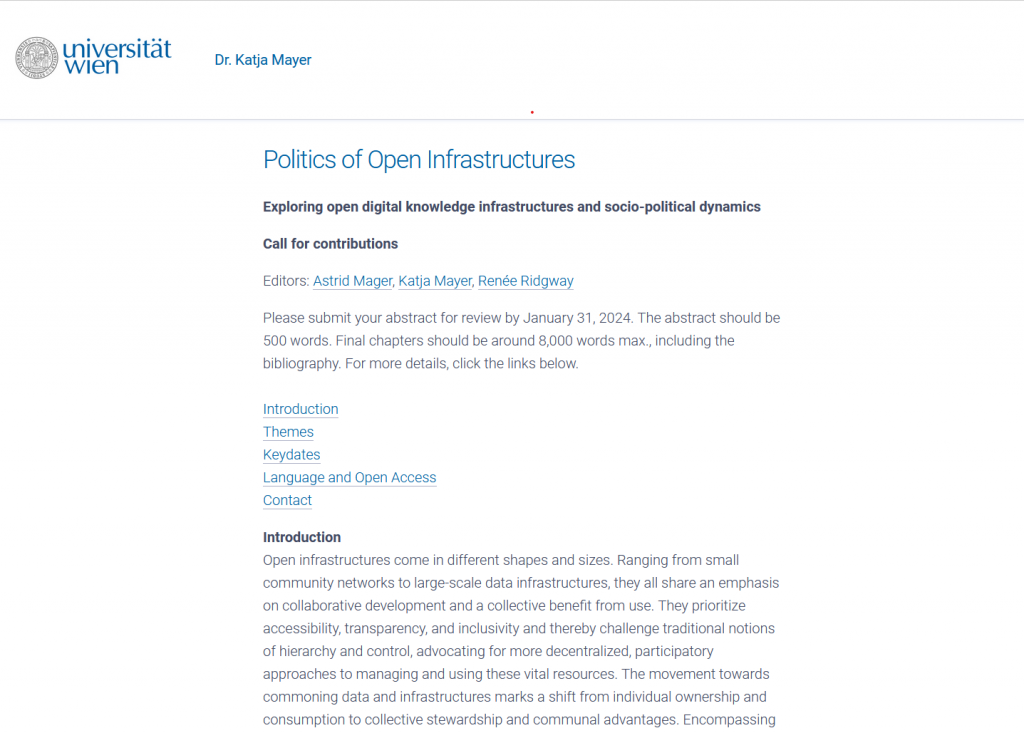Please have a look at the blog post I wrote for the Austrian daily newspaper DerStandard. It’s part of the blog post series of the Young Academy of the Austrian Academy of Sciences. And it deals with the Eurpean way towards digital sovereignty with a question mark at the end 😉 – in German.
Tag Archives: digital technology
Call for book chapters: Politics of Open Infrastructures
Everyone interested in open/ing digital knowledge infrastructures should consider submitting to our call – deadline is 31 January 2024. The book will be co-edited by Katja Mayer, Renée Ridgway and me and is going to be open access – everything else would be ridiculous given the topic! 😉 We’re currently negotiating with De Gruyter..
Here are all the infos you need!
Digitale Weichenstellungen in der Krise
Here’s the link to my Standard blog post on COVID-19 & digitalization (in German); the teaser reads as follows:
E-Learning-Plattformen und Videokonferenz-Tools haben sich in unserem Alltag eingenistet. Kaum ein Haushalt, der sich dem noch entziehen kann. Dennoch dürfen grundlegende technopolitische Fragen nicht aus den Augen verloren werden.
intro course STS & digital tech
This is the abstract for my introductory course into Science and Technology Studies using digital technology as an exemplary case (data, algorithms & prognosis more specifically). I’m already looking forward to heated discussions on social media, AI, self-driving cars, recommender systems and their sociopolitical dimensions and governance implications! (@ the Deptartment of Science and Technology Studies, University of Vienna; in German).
Technik im Alltag am Beispiel von Daten, Algorithmen und Prognosen
Suchmaschinen, soziale Netzwerke und eine Vielzahl von Apps am Handy sind aus unserem Alltag nicht mehr wegzudenken. Sie haben sich in unsere alltäglichen Praktiken eingenistet, gestalten aber gleichzeitig auch welche Informationen wir finden, wie wir über Distanz kommunizieren, und wie wir unseren Körper wahrnehmen, wenn wir zum Beispiel an Gesundheitsapps denken. Sie werfen aber auch eine Reihe gesellschaftspolitischer Fragen auf: Was bekommen wir in Suchmaschinen-Ergebnissen, Newsfeeds und Online-Recommendations zu sehen und was nicht? Welche neuen Formen von Bias und Diskriminierung entstehen dabei? Wie können auf Basis gesammelter Daten Zukunftsprognosen erstellt werden und welche Konsequenzen gehen damit einher? Was bedeutet die zunehmende Quantifizierung unterschiedlicher Lebensbereiche für Individuen und Gesellschaft? Wie können wir global agierende Technologie-Unternehmen und deren Geschäftsmodelle (Stichwort ‘Datenhandel’) regulieren und welche gesellschaftliche Teilhabe ist dabei möglich?
Diese Fragen möchten wir in unserem Kurs anhand von klassischen Einführungstexten aus der Wissenschafts- und Technikforschung (STS), sowie aktuellen Texten aus den kritischen New Media Studies behandeln. In jeder Einheit wird die Lehrveranstaltungsleiterin zunächst ein klassisches STS-Konzept – soziale Konstruktion von Technologie, Politik von Technologie, Actor-Network Theory, Technikentwicklung und Geschlecht, Partizipation etc – vorstellen und zur Diskussion aufbereiten (Pflichttext). Darauf aufbauend werden wir einen Text aus den Themenfeldern Daten, Algorithmen und Prognosen diskutieren, der das jeweilige Konzept zur Anwendung bringt (Referatstext). Dieser wird von Studierenden in der Gruppe aufbereitet und zur Diskussion gestellt/ moderiert. Zusätzlich dazu werden zwei schriftliche Arbeitsaufgaben gestellt, die wir im Seminar diskutieren werden. Voraussetzungen für den Zeugniserwerb sind Anwesenheit, Mitarbeit, mündliche Präsentation (Textdiskussion oder Position in der Bürgerkonferenz), schriftliche Arbeitsaufgaben, sowie die Absolvierung der schriftlichen Abschlussprüfung. Da der Kurs größtenteils auf englischsprachigen Texten basiert sind grundlegende Englischkenntnisse erforderlich. Die Unterrichtssprache ist deutsch.
More information can be found at the University of Vienna website.
the future is now
That’s the handout of the master course “The future is now. Exploring the role of sociotechnical imaginaries in the making and governing of digital technology” I’m currently teaching at the Department of Science and Technology Studies (University of Vienna). The course is tightly connected to both my reasearch project “Algorithmic Imaginaries” and the special issue “We are on a mission” for New Media & Society I’m guest-editing together with Christian Katzenbach. It’s great to go through all kinds of imaginary concepts together with my students! Here’s the abstract:
Contents, aims and methods of course
Digital innovations such as artificial intelligence, blockchain technology or internet of things are driven by imaginaries of future societies. Future imaginaries are enacted to promote digital developments or legitimate certain modes of internet governance. Software providers, technology companies and legislators dig into the rich pool of cultural norms, visions and values to support (or question) digital tools, rules and regulations. Future prospects seem to be central for making decisions in the present. The future, however, is not only imagined, but also constructed, made and unmade in different constellations and contexts.
This course will focus on the role of sociotechnical imaginaries in the making and governing of digital technology. We will discuss questions such as: How does science-fiction contribute to the shaping of future technologies? How do images and metaphors influence public and policy debates on digital technologies? What do sociotechnical imaginaries tell us about the co-production of digital technology and political order? How are cultural norms, visions and values embedded in software design and infrastructure? How can we study sociotechnical design practices and modes of internet governance? To answer these questions we will draw on theories and concepts from science and technology studies (STS) and critical new media studies. Theoretical discussions will be mixed with empirical work (e.g. analysis of a small selection of newspaper articles, online materials, interviews (1 or 2), experiments etc), which will lead to a small research project that students will present in class. In the seminar papers students will individually write an exposé for a research project, which can, but must not be related to the group work presented in class.
“we are on a mission”
This is great news! I’ll be based in Berlin at the Humboldt Institute for Internet and Society (HIIG) in April and May 2018!!! yay!
As part of this research stay Christian Katzenbach and I are organizing a workshop on the role of future imaginaries in the making and governing of digital technology. It will take place on 27 April 2018 at the HIIG in Berlin. We are really happy that Sally Wyatt (Maastricht University) will hold a keynote!!
 See further details of the workshop here. If you’d like to participate in the workshop, please send an english language abstract (300-500 words) until 2 March 2018 (beware of the tight deadline!!!). We encourage you to also submit work-in-progress.
See further details of the workshop here. If you’d like to participate in the workshop, please send an english language abstract (300-500 words) until 2 March 2018 (beware of the tight deadline!!!). We encourage you to also submit work-in-progress.
Please contact me if you have further questions! We’re looking forward to your contributions!
Here’s the full CfP:
“We are on a mission”. Exploring the role of future imaginaries in the making and governing of digital technology
Call for Abstracts
Deadline: 02.03.2018
Workshop
Friday, 27 April 2018
Alexander von Humboldt Institute for Internet and Society
Französische Straße 9,
10117 Berlin, Germany
Keynote: Sally Wyatt (Maastricht University)
“We are on a mission to build a more open, accessible, and fair financial future, one piece of software at a time” promises the software platform Blockchain. “Imagine if everyone could get around easily and safely, without tired, drunk or distracted driving” envisions the self-driving car company Waymo (a subsidiary of Google’s parent company, Alphabet Inc.). “The Regulation is an essential step to strengthen citizens’ fundamental rights in the digital age and facilitate business by simplifying rules for companies in the Digital Single Market” claims the European Commission with regard to the General Data Protection Regulation.
These examples show how imaginaries of future societies are enacted to promote digital innovations or legitimate certain modes of internet governance. They illustrate how software providers, tech companies and legislators dig into the rich pool of cultural norms, visions and values to support (or question) digital tools, rules and regulations. Future prospects seem to be central for making decisions in the present.
What role do future imaginaries perform in the making and governing of present digital technology? How are they mobilised to push or oppose digital innovations such as artificial intelligence, the internet of things, blockchain technology or open source/open data projects? How are prospective imaginaries shaped in policy discourses and governance practices regarding networked technology and global data flows? What significance do European specificities have in global technology imaginations? Can different mechanisms be identified in mainstream discourses and counter-narratives? What happens if future scenarios are contested and digital promises become contradictory?
Themes of the Workshop
These are central questions to be discussed in our workshop. We welcome theoretical, methodological and empirical contributions that help us understand how the future is mobilized to make and govern digital technology in the present.
The workshop is organized around three central themes:
- Theories and concepts to analytically grasp future visions and their roles in the making and governance of digital technology
- Methods and tools to analyze the nexus between future imaginations and their functions in and impact on policy-making and technology development
- Empirical research and case studies on future imaginaries and their roles in the making and governing of present digital technology
Submission
We welcome theoretical, methodological and empirical contributions from various disciplines that speak to the themes of the workshop. Please send an english language 300–500 word abstract including title that describes your contribution to the workshop. We encourage you to submit work-in-progress.
Abstracts are submitted via e-mail to astrid.mager@oeaw.ac.at before 2 March 2018. We will send out notifications on 13 March 2018.
Organisers
Astrid Mager
Institute of Technology Assessment (ITA), Austrian Academy of Sciences
Elise Richter Fellow, Austrian Science Fund (FWF), project no. V511-G29
astrid.mager@oeaw.ac.at
Christian Katzenbach
Alexander von Humboldt Institute for Internet and Society
katzenbach@hiig.de


